Hanxuan Wang
LNN-PINN: A Unified Physics-Only Training Framework with Liquid Residual Blocks
Aug 12, 2025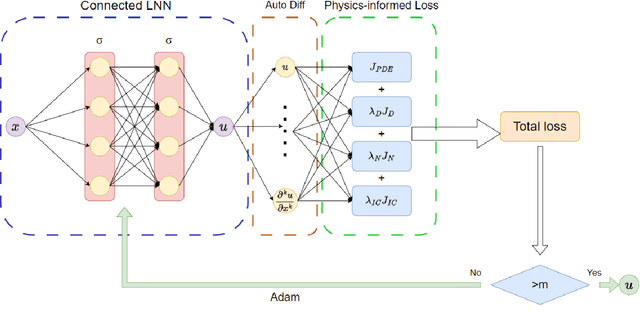

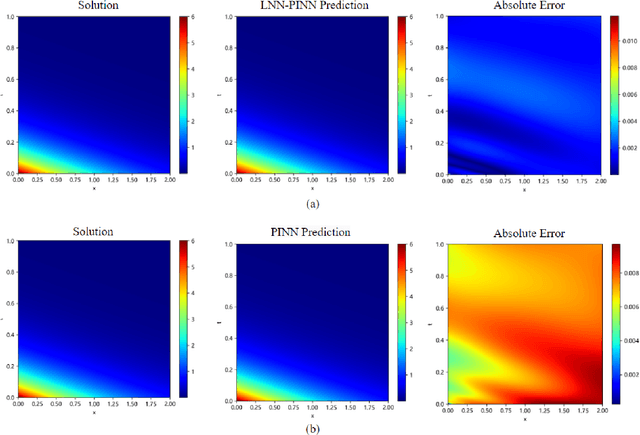
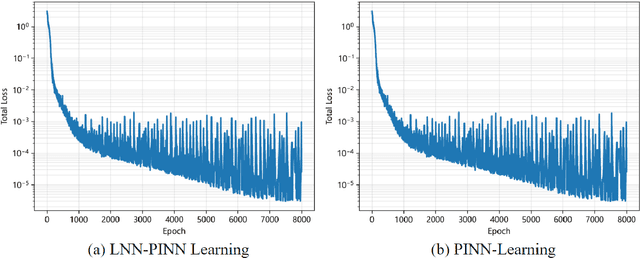
Abstract:Physics-informed neural networks (PINNs) have attracted considerable attention for their ability to integrate partial differential equation priors into deep learning frameworks; however, they often exhibit limited predictive accuracy when applied to complex problems. To address this issue, we propose LNN-PINN, a physics-informed neural network framework that incorporates a liquid residual gating architecture while preserving the original physics modeling and optimization pipeline to improve predictive accuracy. The method introduces a lightweight gating mechanism solely within the hidden-layer mapping, keeping the sampling strategy, loss composition, and hyperparameter settings unchanged to ensure that improvements arise purely from architectural refinement. Across four benchmark problems, LNN-PINN consistently reduced RMSE and MAE under identical training conditions, with absolute error plots further confirming its accuracy gains. Moreover, the framework demonstrates strong adaptability and stability across varying dimensions, boundary conditions, and operator characteristics. In summary, LNN-PINN offers a concise and effective architectural enhancement for improving the predictive accuracy of physics-informed neural networks in complex scientific and engineering problems.
Set a Thief to Catch a Thief: Combating Label Noise through Noisy Meta Learning
Feb 22, 2025Abstract:Learning from noisy labels (LNL) aims to train high-performance deep models using noisy datasets. Meta learning based label correction methods have demonstrated remarkable performance in LNL by designing various meta label rectification tasks. However, extra clean validation set is a prerequisite for these methods to perform label correction, requiring extra labor and greatly limiting their practicality. To tackle this issue, we propose a novel noisy meta label correction framework STCT, which counterintuitively uses noisy data to correct label noise, borrowing the spirit in the saying ``Set a Thief to Catch a Thief''. The core idea of STCT is to leverage noisy data which is i.i.d. with the training data as a validation set to evaluate model performance and perform label correction in a meta learning framework, eliminating the need for extra clean data. By decoupling the complex bi-level optimization in meta learning into representation learning and label correction, STCT is solved through an alternating training strategy between noisy meta correction and semi-supervised representation learning. Extensive experiments on synthetic and real-world datasets demonstrate the outstanding performance of STCT, particularly in high noise rate scenarios. STCT achieves 96.9% label correction and 95.2% classification performance on CIFAR-10 with 80% symmetric noise, significantly surpassing the current state-of-the-art.
A Multi-module Robust Method for Transient Stability Assessment against False Label Injection Cyberattacks
Jun 10, 2024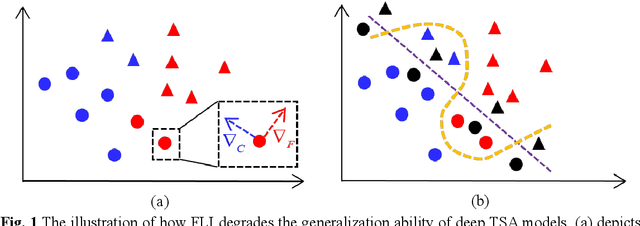
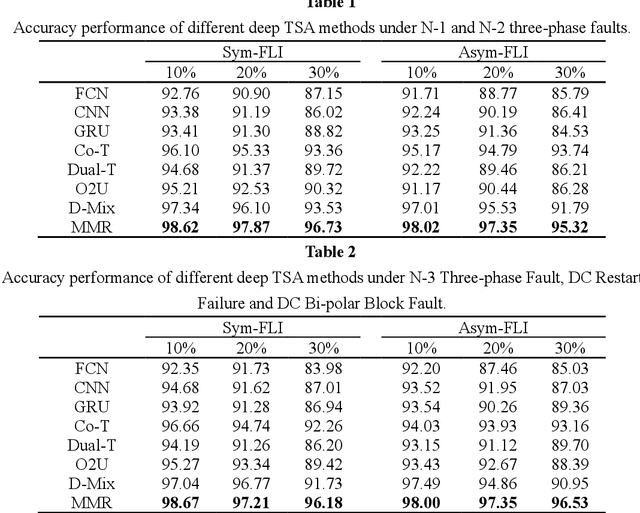
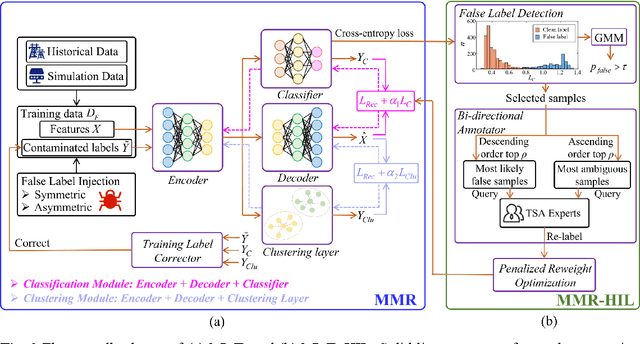
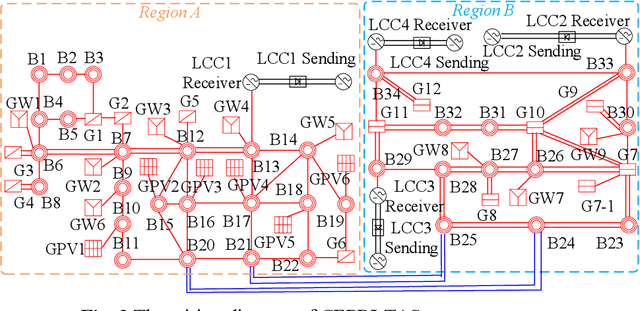
Abstract:The success of deep learning in transient stability assessment (TSA) heavily relies on high-quality training data. However, the label information in TSA datasets is vulnerable to contamination through false label injection (FLI) cyberattacks, resulting in degraded performance of deep TSA models. To address this challenge, a Multi-Module Robust TSA method (MMR) is proposed to rectify the supervised training process misguided by FLI in an unsupervised manner. In MMR, a supervised classification module and an unsupervised clustering module are alternatively trained to improve the clustering friendliness of representation leaning, thereby achieving accurate clustering assignments. Leveraging the clustering assignments, we construct a training label corrector to rectify the injected false labels and progressively enhance robustness and resilience against FLI. However, there is still a gap on accuracy and convergence speed between MMR and FLI-free deep TSA models. To narrow this gap, we further propose a human-in-the-loop training strategy, named MMR-HIL. In MMR-HIL, potential false samples can be detected by modeling the training loss with a Gaussian distribution. From these samples, the most likely false samples and most ambiguous samples are re-labeled by a TSA experts guided bi-directional annotator and then subjected to penalized optimization, aimed at improving accuracy and convergence speed. Extensive experiments indicate that MMR and MMR-HIL both exhibit powerful robustness against FLI in TSA performance. Moreover, the contaminated labels can also be effectively corrected, demonstrating superior resilience of the proposed methods.
An Interpretable Power System Transient Stability Assessment Method with Expert Guiding Neural-Regression-Tree
Apr 03, 2024



Abstract:Deep learning based transient stability assessment (TSA) has achieved great success, yet the lack of interpretability hinders its industrial application. Although a great number of studies have tried to explore the interpretability of network solutions, many problems still remain unsolved: (1) the difference between the widely accepted power system knowledge and the generated interpretive rules is large, (2) the probability characteristics of the neural network have not been fully considered during generating the interpretive rules, (3) the cost of the trade-off between accuracy and interpretability is too heavy to take. To address these issues, an interpretable power system Transient Stability Assessment method with Expert guiding Neural-Regression-Tree (TSA-ENRT) is proposed. TSA-ENRT utilizes an expert guiding nonlinear regression tree to approximate the neural network prediction and the neural network can be explained by the interpretive rules generated by the tree model. The nonlinearity of the expert guiding nonlinear regression tree is endowed with the extracted knowledge from a simple two-machine three-bus power system, which forms an expert knowledge base and thus the generated interpretive rules are more consistent with human cognition. Besides, the expert guiding tree model can build a bridge between the interpretive rules and the probability prediction of neural network in a regression way. By regularizing the neural network with the average decision length of ENRT, the association of the neural network and tree model is constructed in the model training level which provides a better trade-off between accuracy and interpretability. Extensive experiments indicate the interpretive rules generated by the proposed TSA-ENRT are highly consistent with the neural network prediction and more agreed with human expert cognition.
Self-Evolutionary Clustering
Feb 21, 2022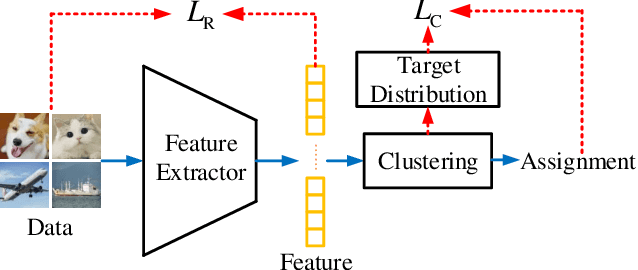
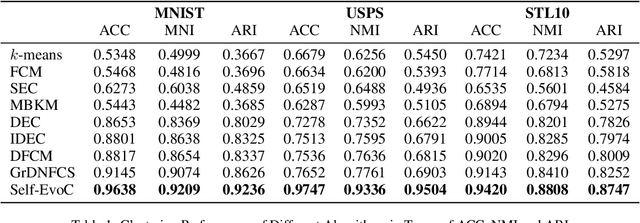
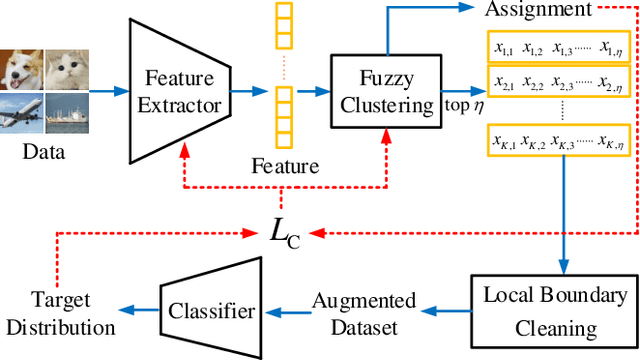

Abstract:Deep clustering outperforms conventional clustering by mutually promoting representation learning and cluster assignment. However, most existing deep clustering methods suffer from two major drawbacks. First, most cluster assignment methods are based on simple distance comparison and highly dependent on the target distribution generated by a handcrafted nonlinear mapping. These facts largely limit the possible performance that deep clustering methods can reach. Second, the clustering results can be easily guided towards wrong direction by the misassigned samples in each cluster. The existing deep clustering methods are incapable of discriminating such samples. To address these issues, a novel modular Self-Evolutionary Clustering (Self-EvoC) framework is constructed, which boosts the clustering performance by classification in a self-supervised manner. Fuzzy theory is used to score the sample membership with probability which evaluates the intermediate clustering result certainty of each sample. Based on which, the most reliable samples can be selected and augmented. The augmented data are employed to fine-tune an off-the-shelf deep network classifier with the labels from the clustering, which results in a model to generate the target distribution. The proposed framework can efficiently discriminate sample outliers and generate better target distribution with the assistance of self-supervised classifier. Extensive experiments indicate that the Self-EvoC remarkably outperforms state-of-the-art deep clustering methods on three benchmark datasets.
 Add to Chrome
Add to Chrome Add to Firefox
Add to Firefox Add to Edge
Add to Edge